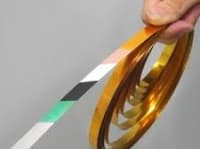A non-surgical invasive way for cardiac myocytes experiencing arrhythmia may be achievable with an enhanced magnetic field across the cardiac myocyte depolarization pacemaker action potential electrophysics. The attached charted graph--see mA/mmsquared vs. Magnetic Field Tesla (L)--illustrates the critical current with the enhanced magnetic field @77degK in rare-earth REBCO superconductor. The critical current runs in 5 microns layer of the REBCO, while the substrate lamina can be used at the liquid oxygen temperature 77degK--available at stored oxygen. We think a caudal and anterior assembly of a pulse generator, small external O2 with circulation, and REBCO material plates could be hung, accessible, and carried, on a left-shoulder strap.
Finally, a 3-D laser printer adds circulating O2 channels in the REBCO plate substrates. BY being accessible incidents of reduced cardiac neuroses, adjustments, replacements of power source battery, or repair of insulation component failures become non-invasive. Readily available amounts of liquid O2 could be kept on hand as required. A parameters control requirement by printed circuit would keep the critical current and Tesla value within this metrical relationship. 1) A lead-less cardio-sinus implant of pacemaker leads and failure/infectious situations eliminated may be accomplished with merely adding a patterned chrono-ionotrophic cardio myocyte SA sinus and/or VA sinus layer of nano-electrodetecter (capacitance coupled when charged) by the basic REBCO enhanced magnetic field superconductor exterior pulse generator. 2) This makes for an outside superconductor pulse generator, nano-electrodetecter chrono/ionotrophic enhancement to electro/chemical electrophysiology for pace/pulse/heart rate. 3) GMR (Giant Magnetoresistance phenomenon allows these super-conductor enhanced magnetics to create an electrical charge to the electro/chemical neuro (cardio myocytes) junction, neuro muscular bundle, synapse and nexus. Arrhythmias, AF, CHF, SA/VA blockage, sick sinus, tachy and bradycardia, wpm syndrome, and torsades de pointes may benefit in much less invasive remedy.
VOTING
Like this entry?
-
About the Entrant
- Name:Oliver Gebhart
- Type of entry:teamTeam members:Least-invasive/Reduced-Surgical to Catheterized Cardio-arrhythmia by Super-conductor Enhanced Magnetic Field Induced by Giant Magnetoresistance GMR Nano-Photodetector Stimulated Cardio-myocytes.
- Software used for this entry:Acrobat
- Patent status:pending








